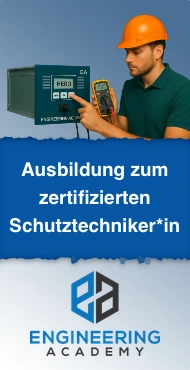EARTfelt Welcome dear friends of protection and the control engineering! The networking of our readers, ie. the networking of developers, engineers, suppliers, operators, sellers, programmers, students and young and old is the most important thing, a strong network is the basis of mutual success. That's why we launched our new series "10 questions for: ...". Again we introduce a driving player in the protection and control engineering world.
In our new post of our highly interesting series we introduce Jenny Bünger. We start with 10 questions to Jenny Bünger.

Jenny Bünger
Short Biography:
Jenny Bünger (Dipl.-Wirt.-Ing.) Has been a project engineer in the field of "Grid Integration of Decentralized Generation Plants" at FGH GmbH since October 2013. Through her involvement in the fields of activity of the calculation of the electrical properties of generating plants, protection design and testing, EZA conformity declarations and the process support of manufacturers and plant operators during commissioning, she brings a great deal of expertise and cross-process experience in the field of decentralized generation and protection. In December 2016, Ms. Bünger took over the management of the Group's inspection and inspection services with regard to grid integration and compliance monitoring of decentralized generation plants. Among other things, through participation in the DKE committee K434 and the program committee of the ETG protection and control technology tutorial, Ms. Bünger constantly deals with current problems in protection engineering.
1. When and where were you born?
1986 in a small town on the Lower Rhine, on the extreme edge of North Rhine-Westphalia
2. Why did you become an engineer?
There was, I think, no initial experience. Many people who know me from my schooldays would probably have prescribed me more in the social field. However, I have always had a fascination for physics and the fact that in the end, you can substantiate and prove (almost) everything about formulas and numbers. The focus has then landed in current and voltage, is probably due to previous impact by the profession of my father.
3. Which university did you go to?
At the RWTH in Aachen
4. How did you come to protection and control engineering?
In fact about my internship at the FGH and the High Voltage Institute (IFHT) of the RWTH Aachen. Every year seminars are offered here at OMICRON on the subject of protection and control technology. During the seminar, the idea arose to take a closer look at the protective behavior of decentralized generation plants, about which I also wrote my diploma thesis. Since there is always something new to discover in protection and control technology, and there is no lack of new challenges as a result of digitization and the change from conventional to regenerative power supply, I have stayed after my final thesis.
5. What was your biggest personal success at work?
Above all, I think I have found something that I really enjoy. To be a small part of it, to develop processes that make the protection and control technology fit for the "new world".
6. In retrospect, would you do things differently?
No, not yet. But I have not had too many years to look back on ...
7. Where do you see the protection and control technology in 2028?
I believe that in future the protection and control technology will be merged much more than already now, and that in addition digitalization will be very advanced and that we will move further and further away from conventional network monitoring, be it through sector coupling and / or cellular approaches etc. It is therefore all the more important to continuously adapt the requirements for protection and control engineering and set standards for the control of protection systems.
8. What is your life motto?
You should always be enthusiastic and open to new ideas. And do not be afraid to ask questions.
9. What can you give or advise to other engineers?
Through curiosity and the constant critical questioning of facts in combination with a huge wealth of experience, which rests in our protection and control technology community, further development and improvement can take place. I have the feeling that the enthusiasm of the people for their profession in this industry is amazingly large and you always find an open ear for questions and discussion.
10. Have we forgotten an important question that we should have asked you?
No, I do not think😉





















